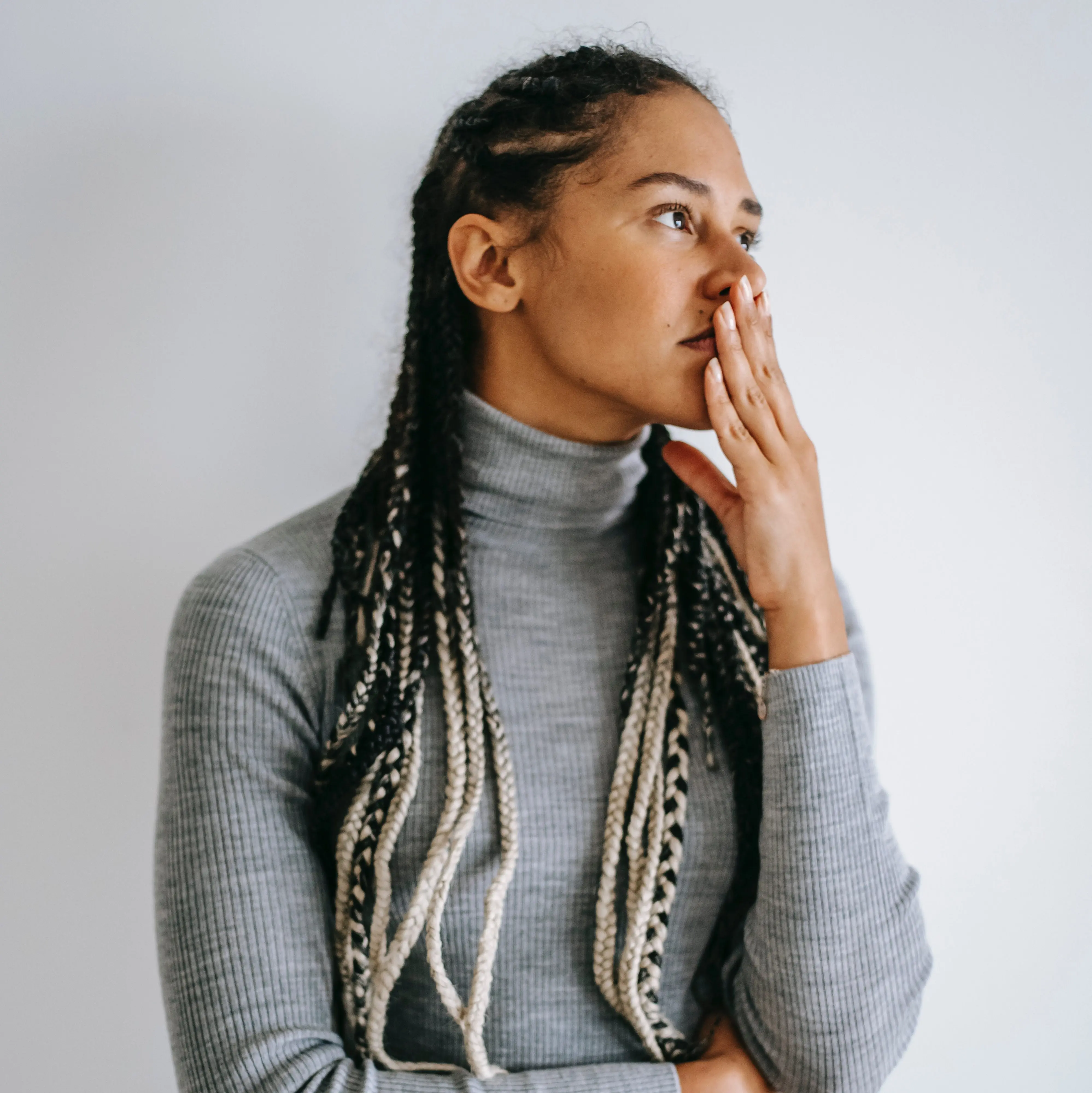Anxiety
Anxiety is common for people of all ages, genders, and backgrounds. Are you tired of struggling with the constant battle of worrying? Have you found that regardless of the situation, you find yourself overthinking all of the possible outcomes that can happen? Has this made it difficult to focus on tasks? Does it feel like the ever-present feeling of inescapable doom haunts you most days? If so, it’s probably hard to fully enjoy your experiences because you’re preoccupied with thinking about the worst-case scenario. On top of the torment your mind puts you through, you might also experience uncomfortable physical symptoms. Usually, this physical discomfort comes in the form of headaches, nausea, and body tension.
You might have wondered if these changes in your body are caused by COVID-19. You’ve likely experienced friends and family who say things to you such as “stop worrying so much.” Even though their intent is to be helpful, their words hurt. Maybe you’ve lost loved ones because they felt overwhelmed by your tendency to worry. You want to stop worrying, and if you knew how, you would. If this sounds familiar, you’re probably struggling with anxiety. However, you don’t have to live with the worry and fear alone any longer.

What is Anxiety?
Anxiety is an emotion characterized by excessive worrying about what might happen, and this tendency often feels out of control. It’s important to remember that experiencing anxiety is completely normal. However, finding the optimal level of anxiety is difficult. If your anxiety is too low or too high, you can become ineffective. Imagine getting ready to take a test without experiencing any anxiety; you wouldn’t study for it! On the other hand, imagine getting ready to take a test while experiencing profound anxiety about failing it. This might paralyze you and prevent you from studying. Both of these scenarios probably lead to you failing your test! Living with anxiety can make it feel like your worry controls your decisions and your experiences, which can lower your satisfaction with life.
What Are the Common Symptoms of Anxiety?
Although anxiety is a normal emotion, there are times that it can intensify and cause other additional symptoms. These symptoms can vary among people, but some of the most common symptoms of anxiety include:
- Difficulty concentrating
- Irritability
- Discomfort in social settings
- Sleep and appetite disturbances
- Excessive worrying
- Body tension
- Nausea
- Fearing the future
- Hyper-awareness of your surroundings
COVID-19 and Anxiety
Phoenix, Arizona, along with the rest of the world, has been hit by COVID-19. This pandemic has been devastating, both physically and emotionally. Facing a potentially deadly virus has led to increased concerns about our health. This is often called “health anxiety.” It’s hard to look around and find someone who is not worried about their health or loved ones. Many people are having a difficult time navigating health anxiety. In response to the pandemic, we now have to consider certain precautions in addition to our normal worries.
Wearing masks, using an excessive amount of hand sanitizer, and keeping our distance from other people is now the norm. However, living in a large city like Phoenix makes it an especially difficult obstacle to navigate. At Sentience Psychological Services, we are aware of this impact, and we can provide you with the support you need. You’re not alone. Our therapists are happy to travel this unexplored path with you while providing the emotional support you need.
Do I Have a Psychological Disorder?
There are many different types of anxiety disorders, including social anxiety disorder and generalized anxiety disorder. Determining if you have a psychological disorder can be difficult for the average person because the experience of anxiety is normal. Our therapists are trained to know the difference between functional levels of anxiety and anxiety disorders. One important part of making this determination is by examining how much distress anxiety brings to your life. They’ll also assess whether your anxiety is problematic by exploring whether it interferes with your daily activities, such as going to work, joining social gatherings, and performing well at school.
Can Psychological Therapy Help?
There is an abundance of evidence that shows that psychological therapy is effective in decreasing problematic levels of anxiety. Our therapists are trained to help you navigate your symptoms without shame. They won’t simply tell you to “stop worrying.” Rather, the first step our therapists take getting to know you by asking about your life history. This allows your therapist to gain a better understanding of how you first developed anxiety and, more importantly, how you’ve maintained that anxiety level over time. Psychological counseling will give you the opportunity to confront the things that scare you the most in a safe and controlled environment. Although the process of treating anxiety can feel overwhelming at first, over time you’ll become the navigator of your choices, rather than allowing your anxiety to dictate them.
Our therapists are familiar with the struggles that you’re experiencing right now, and they’re trained in a multitude of approaches to help alleviate anxiety. We have experience helping people just like you control their symptoms of anxiety. By working together, you’ll learn how to take control of your life. Cognitive Behavioral Therapy, Exposure Therapy, and Sensory Based Practices are often part of our treatment of anxiety disorders.
What is Cognitive Behavioral Therapy?
One approach we use to treat anxiety is cognitive-behavioral therapy (CBT). In CBT, you’ll evaluate the relationship between your beliefs, thoughts, emotions, and actions. Through this process, you’ll learn that anxiety is not a random emotional experience, even though it feels that way. Anxiety is heavily influenced by our thought patterns, which develop from our life experiences. Evaluating the relationship between these aspects can make them more identifiable and tangible, which opens the door for change.
What is Exposure Therapy?
Another approach we use is Exposure Therapy, also called Systematic Desensitization or In-Vivo Exposure. Although this term may sound daunting, it just means you will be progressively exposed to anxiety-provoking stimuli. You might be wondering why a treatment would expose you to something that makes you anxious. Won’t that make things worse? But isn’t it easier to just avoid the things that make you anxious?
Although avoidance feels like it helps in the short-term, research has found that it actually worsens symptoms of anxiety. Our therapists will help you identify avoidance tendencies that have maintained your high levels of anxiety and help you make a plan for exposure. With our help, you’ll begin to systematically expose yourself to the places, people, and things that you’ve been avoiding due to your anxiety. By using this approach, you’ll be able to readjust to environments, people, and situations that you use to enjoy.
What Are Sensory Based Practices?
When our anxiety is heightened, it is often very difficult to soothe our bodies and engage in self-regulation, which is the ability to monitor and control your feelings, emotions, and behaviors to match your environment. When self-regulating, you must have the ability to block out irrelevant information and control your impulses. That’s hard for a lot of people!
Think about the last time you were in a situation that triggered your anxiety. How did you react? Why did you react that way? The ability to self-regulate is influenced by factors such as personal experiences, current environment, and cognitions.
Sensory practices will teach you to use your senses to regulate your body. You’ll learn to eliminate unhelpful behaviors that have caused you to feel over-stimulated and anxious. At the same time, you’ll learn strategies to soothe your body. This can help you move from feeling frantic, anxious, and out of control to a more thoughtful state where you can make rational decisions.

How Do I Get Help?
If you would like to alleviate your anxiety, reach out to us. We’re ready to join you in this journey to feeling healthy again. Anxiety doesn’t need to control your life anymore.
